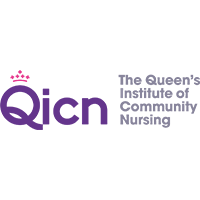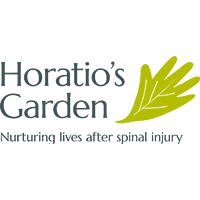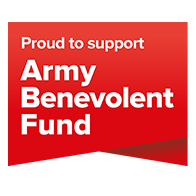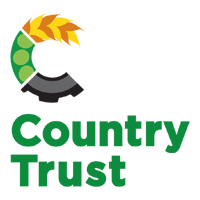Dee Venner: ‘My happy place’
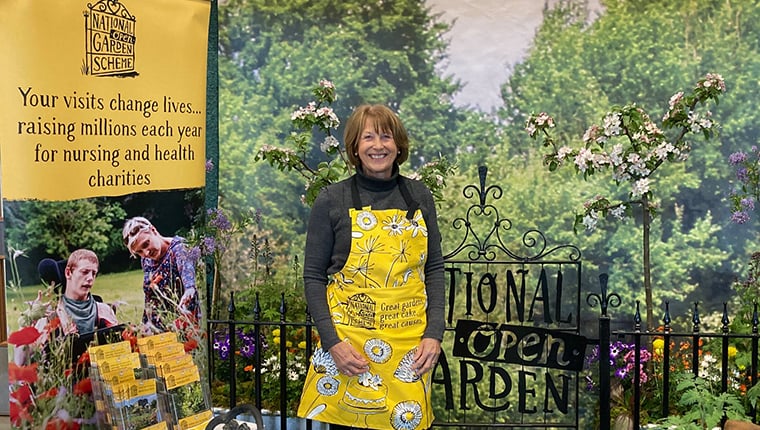
For garden designer Dee Venner visiting a National Garden Scheme garden had long been part of her enjoyment of gardens. But in 2019 a cancer diagnosis made her re-evaluate what was important. Deciding to focus fully on her family and gardens she became a volunteer for the charity and in 2023 took on the role of County Organiser for North Yorkshire. A firm believer in the restorative effects of gardens, and gardening visiting we caught up with Dee to find out more:
What or who first inspired you to become a garden designer?
My grandfather and my mother both gardened and after having children, I was a stay-at-home mum and decided to enrol at Capel Manor Horticultural college to learn more about gardening. I took what was then in the 1980s the RHS General Horticulture Certificate – an evening class two year course. One of my tutors taught us about plants and how to position them for effect. She was inspirational in a Beth Chatto way – form, colour, contrast, impact etc. From this I knew I wanted to get into garden design but there were no courses or garden design schools then.
I returned to Capel Manor to do an Amenity Horticulture course which covered some design and surveying and Christine Walkden was one of my tutors – another inspirational character – full of plant knowledge, down to earth and fun. From that I set up my own garden design business. It was a way of indulging my passion, using my knowledge and working from home giving me flexibility to meet my young children’s needs. I didn’t much like technical drawing and so took a course in Computer Aided Design at the local Education College. I adapted the program to my garden design needs as it was in those days an engineering design tool. I may well have been the first garden designer in the country to use CAD.
Who or what inspired you to become a volunteer for the National Garden Scheme and what was your route to County Organiser?
As soon as lockdown was lifted, I visited a National Garden Scheme garden. There I met two National Garden Scheme volunteers and got chatting. (I had been on the North Yorkshire committee of the Art Fund, but this was disbanded in 2019, so I was at a loose end). They were looking for volunteers. Initially helping with teas and parking didn’t appeal but then the next day I got a visit from the North Yorkshire County Organiser David Lis, who explained the role of an Assistant County Organiser and I very soon realised that this was where I wanted to be. My experiences from garden design and previous careers in recruitment and my inherent organisational skills could all be put to good use. After 18 months David asked if I would take over as County Organiser. I stalled for a few months as it hadn’t been long since I’d had radiotherapy, and I wanted to be sure that I was well enough to take on the role which I readily took over in October 2023.
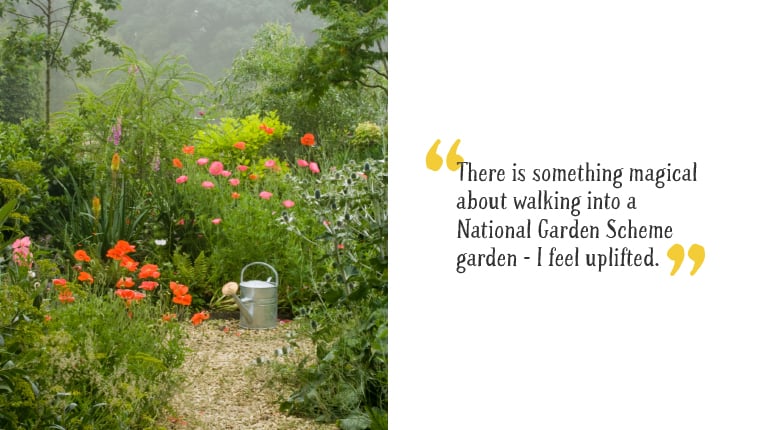
What is the best thing about being a volunteer / County Organiser?
It’s my happy place. What’s not to love? Visiting beautiful gardens, meeting talented and dedicated garden owners, seeing the pleasure on visitors faces as they leave, having a supportive head office team. And as a County Organiser, discovering new gardens, meeting new garden owners and reassuring them of our support and, of course, having a fantastic team of Assistant County Organisers who are equally talented and to whom I can delegate with confidence.
What is the worst thing about being a volunteer / County Organiser?
Dare I say the annual registration of gardens. Chasing garden owners, checking and re-checking details for openings in the year ahead. Getting all the information together in time to hit the deadlines for the Garden Visitor’s Handbook and County Booklets.
Would you recommend the role to others and why?
Definitely, but only to the right person. It’s not difficult to find people who have a love of gardening which I think is an essential quality. The first season for any new Assistant County Organiser is not easy – there is a lot to learn – but with encouragement and support it is rewarding to see that passion for the National Garden Scheme emerge.
When were you first diagnosed with lung cancer and where did you receive treatment?
I was diagnosed between Christmas and New Year 2019. I was having chest pains and not feeling great and my husband insisted on taking me to A&E. After a raft of tests (I thought it might be a blood clot) I was told that a shadow had shown up on my lung. I was scanned the next day, and it was confirmed that I had early-onset lung cancer. It was explained that this was operable, curable, and a total fluke that it had been found. I was so lucky. Even luckier, I was taken into hospital for a lobectomy just days before the first lock-down in March 2020.
Were any of the National Garden Scheme beneficiaries part of your treatment?
As soon as I was diagnosed, I had a Macmillan nurse assigned to me. The hospital had a specialist purpose cancer care unit built with input from Macmillan and my Macmillan nurse supported and reassured before my operation and still does today.
How did the diagnosis change your view of life?
I was scanned every six months for 18 months after my surgery and thought I was cured. However, after the 18-month scan, I got a phone call. There was still some cancer there. I then had three weeks of daily radiotherapy. It wasn’t until several months later when I realised that the things in my life I had been doing because I felt I should be, were no longer important to me (being a parish councillor, producing the village newsletter, etc). What mattered was my family first, and my passion for gardening. So, when I was approached about volunteering for the National Garden Scheme, I knew instantly that this was an important thing for me to do.
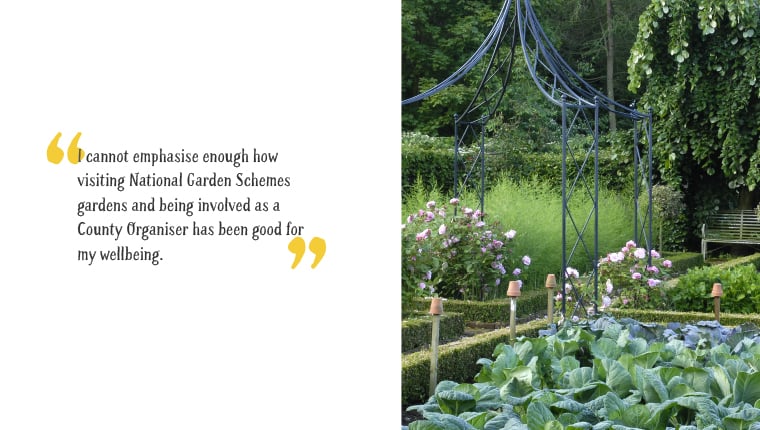
When did you became aware of all the money that the National Garden Scheme donates to nursing and health charities, including Macmillan Cancer Support?
I’m ashamed to say that it wasn’t until I became a volunteer in 2022 that I learned about the tremendous amount raised by the National Garden Scheme and about their beneficiary charities. All those years of picking up a booklet and not knowing!
Would you say that gardens and gardening played any part in your recovery?
I cannot emphasise enough how visiting National Garden Schemes gardens and being involved as a County Organiser has been good for my wellbeing. There is something magical about walking into a National Garden Scheme garden – I feel uplifted. All the cares of the world vanish. It’s such a wonderful place to be. As time goes on after my radiotherapy (and I am scanned every 6 months for the next 5 years) I know that being in a garden, either working or visiting, gives me such a positive feeling which can only help in my recovery. And my oncologist is delighted with me. He can see how positive and fit I am.
What’s your view on the importance of gardens to health and wellbeing?
It’s hugely important. I think society today has become so insular through the use of screens, long working hours and lack of time. Just seeing the smiles on visitor’s faces as they leave one of our gardens, saying a thank you as they pass by, is proof enough of the benefit that gardens give.
FIND ALL YORKSHIRE GARDENS TO VISIT BY CLICKING HERE
This story was originally published in the 2025 Little Yellow Book of Gardens and Health – to read it click here





